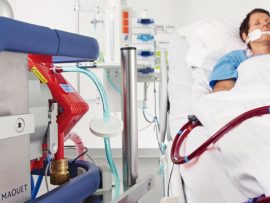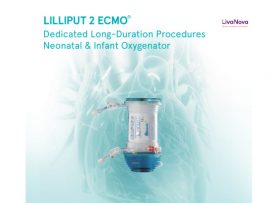Abstract Background and objectives Venous-Arterial Extracorporeal Membrane Oxygenation (VA-ECMO) is a pivotal means for rapid cardiopulmonary support, yet it may result in lower limb ischemia. This study aims to explore..
Read MoreAbstract Extracorporeal membrane oxygenation (ECMO) is commonly used for critically ill patients and associated with high rates of kidney injury and mortality. This study aimed to assess the impact of..
Read MoreAbstract OBJECTIVES The study’s aim was to investigate the outcomes and risk factors for mortality in patients undergoing surgery for acute type A aortic dissection receiving concomitant venoarterial extracorporeal membrane..
Read MoreAbstract Background Venoarterial extracorporeal membrane oxygenation (VA ECMO) is a critical therapeutic intervention that is commonly used in the management of paediatric patients with congenital heart disease (CHD). This procedure..
Read MoreAbstract OBJECTIVES The study’s aim was to investigate the outcomes and risk factors for mortality in patients undergoing surgery for acute type A aortic dissection receiving concomitant venoarterial extracorporeal membrane..
Read MoreAbstract Background Pericardiectomy is the curative treatment for constrictive pericarditis, yet postoperative low cardiac output syndrome (LCOS) may occur. The application of venoarterial extracorporeal membrane oxygenation (VA-ECMO) in post-pericardiectomy refractory..
Read MoreAbstract We read with great interest the recent study by Stadlbauer et al. [1] published in Intensive Care Medicine, which evaluates the impact of reperfusion therapy including systemic thrombolysis (SYS), surgical..
Read MoreAbstract The use of venoarterial extracorporeal membrane oxygenation (VA-ECMO) for temporary mechanical circulatory support in various clinical scenarios has been increasing consistently, despite the lack of sufficient evidence regarding its..
Read MoreAbstract Background: We used machine learning models incorporating rich electronic medical record (EMR) data to predict neurological outcomes after venoarterial extracorporeal membrane oxygenation (VA‑ECMO). Methods: This was a retrospective..
Read MoreAbstract Background: Venoarterial extracorporeal membrane oxygenation (VA-ECMO) is increasingly used to treat cardiogenic shock. However, VA-ECMO might hamper myocardial recovery. The Impella unloads the left ventricle. This study aimed to..
Read MorePeripheral cannulation for initiation of neonatal venoarterial extracorporeal membrane oxygenation is an essential technical skill in the armamentarium of every congenital cardiac surgeon and is necessary for the care of..
Read MoreIntroduction Extracorporeal Membrane Oxygenation (ECMO) is a life-support technology used in patients with severe cardiac and/or respiratory failure. The two primary ECMO configurations are Veno-Venous (VV) ECMO and Veno-Arterial (VA)..
Read MoreAbstract Electrocardiogram (ECG)—synchronized pulsatile veno-arterial extracorporeal membrane oxygenation (V-A ECMO) is a recent development in extracorporeal therapy for patients with severe cardiogenic shock. Although preclinical studies have shown benefits of..
Read MoreAbstract To investigate the relationship between platelet counts within the first 24 hours of veno-arterial extracorporeal membrane oxygenation (V-A ECMO) support and in-hospital mortality in postcardiotomy ECMO patients. Adult patients..
Read MoreAbstract Background: Venoarterial Extracorporeal Membrane Oxygenation (VA-ECMO) is a means of supporting the lungs or the heart and lungs in patients with hemodynamic compromise that is refractory to conventional measures...
Read MoreAbstract Cardiogenic shock (CS) is a critical condition with high mortality, characterized by reduced cardiac output (CO) and tissue hypoperfusion, despite advancements in treatment. Traditional hemodynamic markers like CO measurements,..
Read MoreAbstract Objectives Patents with out-of-hospital cardiac arrest (OHCA) are at high risk of death or poor neurologic recovery if spontaneous circulation is not rapidly restored. Emergent mechanical circulatory support with..
Read MoreAbstract We read with great interest a recent article on the association between body mass index (BMI) and outcomes in patients supported by venoarterial extracorporeal membrane oxygenation (VA-ECMO). In a review..
Read MoreAbstract Aims Knowing the upper time limit for successful weaning from temporary mechanical circulatory support in cardiogenic shock will help with decision‐making regarding advanced heart failure (HF) therapy or considering..
Read MoreAbstract Background Veno-arterial (V-A) and veno-venous (V-V) extracorporeal membrane oxygenation (ECMO) are crucial support modalities during lung transplantation, yet their comparative effectiveness remains unclear. Methods We conducted an 8-year retrospective..
Read MoreAbstract Mortality remains elevated during venoarterial extracorporeal membrane oxygenation support (VA-ECMO) for cardiogenic shock and the role of inflammation is uncertain. By using the neutrophil-to-lymphocyte ratio (NLR), we investigated inflammatory..
Read MoreAbstract Background Acute lung injury and acute respiratory failure are frequent complications of cardiogenic shock and are associated with increased morbidity and mortality. Even with increased use of temporary mechanical..
Read MoreAbstract While renal replacement therapy (RRT) allows for precise fluid management as well as addressing electrolyte imbalances and the removal of other necessary compounds, its early initiation has not shown..
Read MoreAbstract Background Veno-arterial (V-A) extracorporeal membrane oxygenation (ECMO) is commonly used for patients with cardiac arrest, cardiogenic shock, or heart failure and is a life-saving technique. Computed tomography angiography (CTA)..
Read MoreAbstract We read with great interest a recent position statement on the physiology and presentation of a means of unambiguous identification of native lung and membrane lung blood flow occurring..
Read MoreAbstract Venoarterial extracorporeal membrane oxygenation (VA-ECMO) has been utilized to treat massive pulmonary embolism (PE) accompanied by cardiac arrest or refractory cardiogenic shock. Our team opted for a femoral-femoral approach..
Read MoreAbstract Venoarterial extracorporeal membrane oxygenation (VA-ECMO) is applied for the treatment of cardiogenic shock. Concomitant left ventricular unloading (LVU) with a microaxial flow pump (mAFP) enables myocardial and pulmonary recovery..
Read MoreAbstract Introduction No clear guidelines exist for unfractionated heparin (UFH) monitoring in adult patients on veno-arterial extracorporeal life support (VA-ECLS) for refractory cardiogenic shock. In this study, we sought to..
Read MoreAbstract Background Cardiac arrest in pregnancy is rare. Clinicians need to adapt management to the altered anatomy and physiology of pregnancy, and the well-being of two patients (mother and foetus)..
Read MoreAbstract Children requiring veno-arterial extracorporeal membrane oxygenation (VA ECMO) or cardiac surgery often undergo cervical cannulation or carotid artery clamping, which can interrupt cerebral circulation. Inadequate collateral flow through the..
Read More























